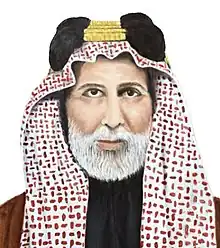| Muhammad bin Sabah Al-Sabah | |
|---|---|
| Pasha | |
 | |
| 6th Ruler of Kuwait | |
| Reign | May 1892 – 1896 |
| Predecessor | Abdullah II |
| Successor | Mubarak I |
| Born | 1838 Sheikhdom of Kuwait |
| Died | 17 May 1896 (aged 57–58) |
| Issue | Ali Sabah Saud Khalid Athbi Latifa Sabika |
| House | Sabah |
| Father | Sabah II |
| Mother | a daughter of Emir Muhammad bin Ibrahim Al Thaqib |
Muhammad bin Sabah Al-Sabah (Arabic: الشيخ محمد بن صباح الصباح; 1838 – 17 May 1896) also known as Noor Al Sabah, was the sixth ruler of the Sheikhdom of Kuwait between May 1892 and May 1896 during which he held the title of Pasha from the Ottoman Sultan. He was the second son of Sabah II Al-Sabah and succeeded his half-brother Abdullah II Al-Sabah upon his death in 1892.[1]
When Muhammad came to power, disagreements soon arose between him and his brother Mubarak. Muhammad dealt with this by occupying Mubarak with foreign affairs, dispatching him to Hasa with an Ottoman force, and to the desert in order to settle affairs amongst tribes without providing funding.[2]
In 1896, Mubarak summoned his sons Jaber and Salim, and some supporters, and rode to Kuwait where they secretly entered Muhammad's house.[2] Muhammad and his brother Jarrah were assassinated in his house by Mubarak Al-Sabah on 17 May 1896.[1][3]
Following the assassination, Mubarak would become the ruler of Kuwait[4] and the sons of Muhammad and Jarrah were exiled to al Zubayr, staying there until 1921.[5]
References
- 1 2 H. St. John Philby (1955). Saudi Arabia. New York: F.A. Praeger. p. 236. OCLC 317764387.
- 1 2 Jill Crystal (1995). Oil and politics in the Gulf: Rulers and merchants in Kuwait and Qatar. Cambridge, UK: Cambridge University Press. p. 23. ISBN 9780511558818.
- ↑ Salwa Alghanim (15 October 1998). The Reign of Mubarak-Al-Sabah: Shaikh of Kuwait 1896–1915. I.B.Tauris. ISBN 9781860643507.
- ↑ Peter Sluglett (December 2002). "The Resilience of a Frontier: Ottoman and Iraqi Claims to Kuwait, 1871-1990". The International History Review. 24 (4): 788. JSTOR 40111134.
- ↑ Abdulrahman Alebrahim (2018). "Kuwaiti-Zubayri Intellectual Relations until the Beginning of the Twentieth Century: 'Abd al-'Aziz al-Rushayd as an Example". In Marc Owen Jones; Ross Porter; Marc Valeri (eds.). Gulfization of the Arab World. Berlin, Germany: Gerlach Press. pp. 133–150.